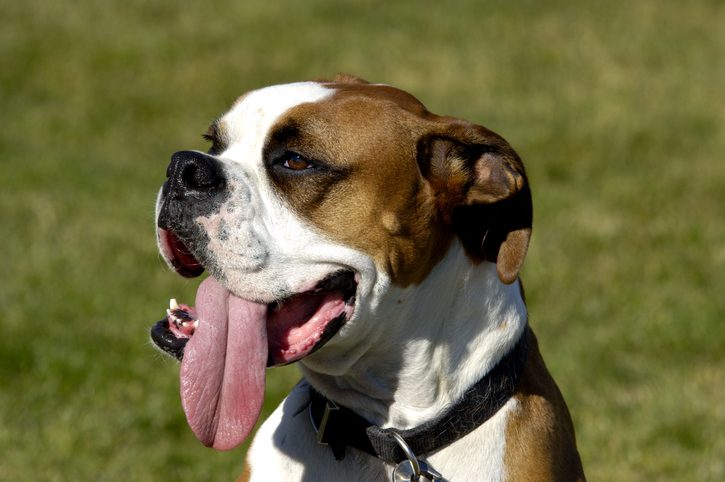As a dog owner, it’s normal to get worried about a wide variety of problems. Panting is one behavior that can be concerning to dog owners, especially when it is seen in dogs who don’t typically pant very much.
The good news is that dog panting isn’t always a cause for concern, and it often indicates very minor problems at most. However, in some cases, panting can be associated with much more serious issues that need to be handled by an emergency vet. Check out the list below to find out more about some of the most common causes of panting behavior in dogs.
Mild Causes for a Dog’s Panting
If your dog is panting for any of these reasons, there is no need to rush to the veterinarian.
Heat
Heat is the most common cause of panting behavior in dogs. Even dogs who are laying on a cool floor indoors on a very hot day may pant, and this is perfectly normal. If your dog is behaving normally otherwise and doesn’t show symptoms of heatstroke, they should be fine with some cool water or maybe some ice chips.
Overexertion
Overexertion in play and exercise may also cause dogs to pant, just like humans do in the same situation. If your dog’s breathing goes back to normal in a few minutes after calming down, this is also normal and is no cause for concern.
Excitement
A dog who is very excited may get themselves so worked up that they start panting. This type of panting behavior is less common than others listed here, but it can be seen in dogs who already have a predisposition to pant frequently.
Breed
Your dog’s breed may also cause them to pant more than other dogs of different breeds. Some breeds are just naturals when it comes to panting and drooling. If your dog comes from one of these breeds and seems to pant almost all the time, they are probably fine—but you can ask your vet to be sure.
Moderate Causes for a Dog’s Panting
If your dog is panting for any of these reasons it would be a good to reach out to your veterinarian.
Anxiety
Anxiety can cause panting in dogs, especially in dogs who are anxious for a long time. If your dog is afraid of something or is put into a situation that makes them anxious—such as a night of fireworks outside—they may pant until the safe feeling returns.
Pain
Pain can cause panting in dogs too. Many times, dogs who are in pain will pant as they try to cope with the pain they are dealing with. They may also pant because of nausea associated with pain levels.
Illness
Several kinds of canine illnesses contribute to panting behavior in dogs. Any respiratory condition that affects the way your dog breathes and any illness that causes pain or stomach upset can lead to panting. If your dog is also drooling, this is another sure sign that they are either sick or in pain and needs to see their vet quickly.
Nausea
Nausea causes dogs to pant and drool. Carsickness can be one mild cause of this type of panting behavior, but illness and pain can also contribute. If your dog is vomiting or retching along with the excessive panting, nausea is probably the cause of the issue.
Severe Causes for a Dog’s Panting
Dogs that are panting due to any of the things below need to see an emergency veterinary right away.
Difficulty Breathing
Breathing trouble can be caused by inhalation of foreign objects, worsening of illness, and more. Any difficulty breathing should be treated by an emergency vet immediately. No matter what the cause, if your dog is having trouble breathing, you may notice them panting significantly as they try to breathe.
Ingestion of Poison
If your dog ingests poison or any substance that may be toxic, this could lead to excessive panting. You may notice other symptoms as well, including excessive drooling, vomiting, diarrhea, loss of consciousness, seizure, and more. Go to the emergency vet immediately for this type of problem.
Heatstroke
Dogs who are suffering from heatstroke typically pant and drool excessively as some of the first signs of this deadly condition. If it is very hot outside and your dog has overexerted or has been left alone in a vehicle, heatstroke could be the culprit. Go to the emergency vet if you suspect this condition.
Heart Disease
Some types of heart disease may contribute to panting behavior in dogs. Heart disease may make it harder for dogs to breathe and circulate blood properly, leading to excessive panting over time.
Talk with Your Northern Pike Veterinary Hospital Vet
Based on this information, you can easily recognize when you may need to call your regular vet and when panting may indicate a trip to the emergency vet is needed, too. Sometimes, you can skip the vet altogether, depending on the cause of the panting.
If you’re unsure what’s causing your dog to pant or you suspect it could be a moderate to severe problem, don’t wait to see a vet. The sooner you have your pet checked out, the more likely they will be to fully recover from the underlying problem with ease.
If you have questions about your dog’s wellness give Northern Pike Veterinary Hospital a call at 412-373-8580!


